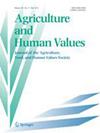Science as a territory in dispute: an analysis of power and paradigms in the conceptualization of agroecology
Abstract
Agroecology is often portrayed as a new paradigm challenging industrial agriculture. What a paradigm or a so-called paradigm shift consists of, is not always clear, however. This paper does not aim to introduce a novel definition of agroecology, but rather to critically interact with the concept of paradigm shift, both through a focus on power relationships within academia and between academia and alternate epistemologies. Our arguments stem from comprehensive ethnographic field work done in Argentina between 2019 and 2024 and are based on the notion that (a) academic spaces are inherently contested spaces and knowledge production does not occur in a vacuum, but in a context shaped by strong economic interests and power dynamics; (b) agroecology is a paradigm in consolidation; and (c) the role of non-Western epistemologies in the production of knowledge on agroecology is often ignored and the relationship between academia and actors involved in these epistemologies is often an unequal one. Through the interrogation of the characterization of agroecology as a “paradigm shift”—often used as a buzzword in academia—we contend that in order for agroecology to be truly emancipatory and not just another frontier of capital accumulation, a transdisciplinary shift is fundamental.

 求助内容:
求助内容: 应助结果提醒方式:
应助结果提醒方式:


